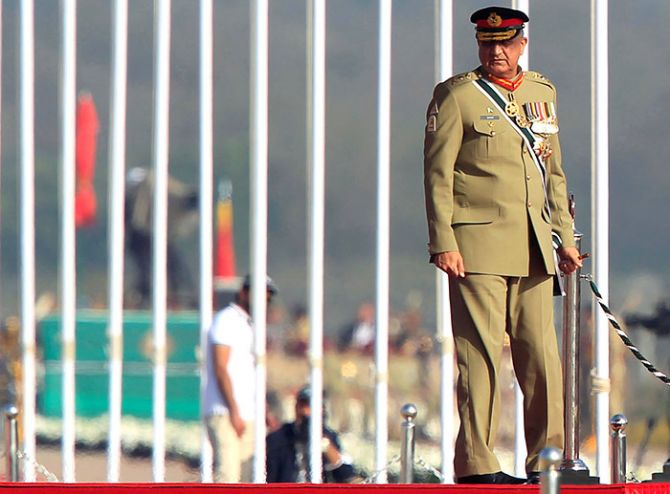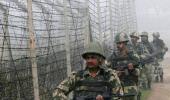'What we are today witnessing is the final act of the Pakistani army trying to retain its turf,' argues Colonel Anil A Athale (retd).

It is surprising that major events in our neighbourhood are largely ignored by our media.
One refers to the unseating of Nawaz Sharif as Pakistan's prime minister and his and his daughter Maryam's subsequent indictment on corruption charges.
Parallel with this, one has seen the military's increasing hold on the government apparatus in Pakistan.
General Qamar Javed Bajwa, the current Pakistan army chief, has publicly commented on the government's economic policies.
There is widespread speculation in the Pakistani media that the Pakistan military, always the country's behind-the-curtain ruler, may be planning to emerge from the shadows.
It is almost a cliché to say that while other countries have armies, the Pakistani army has a country. It is a little more complicated than this simplistic notion.
We need to understand Pakistan in its historical context to understand its present and predict its future. The history of a society and nation is what DNA is to an individual.
It is the lack of understanding of the Pakistani DNA that has seen Indian leaders from Jawaharlal Nehru to Narendra D Modi making periodic peace attempts and failing (remember Modi's surprise visit to Lahore on December 25, 2015).
Since the area that forms Pakistan was an integral part of India or Hindustan until 70 years ago, it is necessary to have an integrated approach to Islamic rulers.
The Muslims have a belief that that Islam is the final code of religion as revealed by Mohammed, the last Prophet. Hence, no new religion or fresh prophet is expected. Islamic tradition does not rule out the coming of mahdis (restorers) and mujaddids (regenerators).
According to tradition, the mahdi will emerge when Islam is in its last gasp in the world; he will restore the religion to its true glory.
A mujaddid is sent by Allah in times of spiritual decay and religious crisis.
In the early centuries of Islam, when Muslims faced great difficulties, the faithful in their distress looked for the promised mahdi who would dispel oppression and fill their world with equity and justice.
This desire for a promised mahdi has been successfully exploited by several imposters in Asia, Africa and Europe. In India, at different times, many imposters claimed to be the promised mahdi.
However, mujaddids have often been accepted and many have been officially listed in each century.
Sheikh Ahmad -- (born in 1563 at Sirhind in Punjab), the first mujaddid born in India -- is known as Mujaddid Alaf-I-Sani (Regenerator of the second millennium).
Historically, it is accepted that Emperor Akbar accelerated the natural process of the Indianisation of the Muslim community in Hindustan, politically, culturally and spiritually.
Akbar was the first great moderniser. But because Akbar attempted to chalk out a programme for the betterment of the community at the secular level, he was never accepted by Sunnis as a true regenerator of Islam.
On the other hand, Sheikh Ahmad is not only accepted as a mujaddid, but is also considered as the founder of the religio-political reform movement of orthodox Islam in India.
Sheikh Ahmad's mission in India, at a critical period in its history, ended Akbar's work and won over the emperor's successors to his view of orthodox Islam.
Sheikh Ahmad preached dynamic hatred against non-Sunnis in general and against non-Muslims in particular.
From that point of view, Sheikh Ahmad is the father of communal hatred, religious bitterness and fanaticism in India.
Because of his anti-Shia activities he antagonised Jahangir's Persian-dominated court which warned the emperor about the orthodox movement that could threaten his throne.
Sheikh Ahmad was imprisoned by the emperor on the pretext that he had neglected court etiquette. There were many moves to have the sheikh killed, but Jahangir saved him each time and released him after a year.
There is evidence that thereafter he functioned as Jahangir's adviser. The occasional outbursts of bigotry on Jahangir's part and his anti-Hindu sentiments and policies may be traced to the sheikh's influence on the fickle-minded emperor.
The work of rejuvenating Islam in India was continued by Sheikh Ahmad's sons and disciples after his death. One of his sons was Aurangzeb's adviser.
The puritan in Aurangzeb was not a sudden outburst based on whims, but the logical outcome of far-sighted reactionary influences.
But fanaticism is never long lasting.
Islam, like other great religions, is a product of the social malaise in which it was born. It is a moral and social system. Its moral theories are timeless and universal.
But its social codes and laws, which were conceived and meant for 7th century Arab lands, could not be valid in modern times.
Towards the beginning of the 19th century, because of the growing domination of the Marathas and Sikhs, the Muslim elite and ulema began to feel insecure.
After the Mughal army was defeated at Buxar in 1764, clerics Shah Abdul Aziz and Haji Shariatullah issued a fatwa in 1803 declaring that India was no longer Darul Islam, but Darul Harb (enemy country).
The 19th century saw the rise of the Barelvi sect in India. Sayyad Ahmed Barelvi went to Mecca in 1822 and became a 'Wahhabi'. In 1830 he returned to India and captured Peshawar. He declared a jihad against Maharaja Ranjit Singh.
Through a network of mosques and propaganda, Barelvi attracted recruits from all over the country. Even Muslims from far away Kerala joined him. Such was his appeal of jihad.
But his strict Islam was not to the liking of the Pathans. The Barakzai tribe revolted against him.
Militarily, he was no match for the Sikhs. Barelvi and his disciple Shah Mahhamed Ismail were killed in the battle of Balakote in 1831.
At that time, Muslims in some respects were culturally indistinguishable from their Hindu neighbours.
For example, the Moplahs in Travancore observed matrilineal rules of descent and the Muslims of South Canara and Coimbatore followed the Moplahs.
Hindu laws of joint family were common amongst the Khojas, Kutchhis, Halai Memons and Bohras of Gujarat.
Muslim peasants in Punjab and the 'taluqdars' in the then United Province followed Hindu laws of succession.
The Sharia was prevalent only among the Muslim elite in Delhi and north India.
The Barelvi movement marked the beginning of a deliberate move on the part of the Muslims to culturally separate themselves from the Hindus.
The British played upon this and the Lucknow pact of 1916 granting separate electorates put a seal on this artificial divide.
Apart from the cultural divide, British agents played a major role in stirring up riots. British agents were caught red handed while provoking riots in the 1930 Chittagong riots.
As the freedom struggle intensified and the Congress led by Hindus was in the forefront, the British created the Muslim League to counter this.
Pakistan was born out of this process.
Armed might or the army was at the centre of Islamic rule in India. The rest of the country existed to support it economically.
The jiziya or poll tax imposed only on Hindus was a major source of revenue, hence, there was no incentive to convert people to Islam.
Pakistan subconsciously follows the Mughal model with the army at the centre of the State.
In earlier centuries, the vast non-Muslim economic resource base provided revenue, this was no longer available in a Muslim majority State.
Luckily for Pakistan, for most of its 70 years, the US and the West with its generous military and economic aid as well as Arab countries sustained this bloated military apparatus.
The Americans found the Pakistan army a reliable tool to control the Middle East (remember Zia-ul Haq and his Pakistani brigade massacring Palestinians?).
The conditions that permitted the militarised State of Pakistan to remain afloat economically are changing.
Thanks to the rise of fundamentalism and terrorism based on Pakistani soil, the West is no longer willing to pay its mercenary army.
The meltdown in oil prices has reduced Arab oil money flowing to Pakistan.
Caught in this twin pincer, Pakistan today stares at a bleak economic future.
What we are today witnessing is the final act of the Pakistani army trying to retain its turf.
Colonel Anil A Athale (retd) is a military historian.
IMAGE: Pakistan's army chief General Qamar Javed Bajwa arrives to attend the Pakistan day military parade in Islamabad, March 23, 2017. Photograph: Faisal Mahmood/Reuters











 © 2025
© 2025